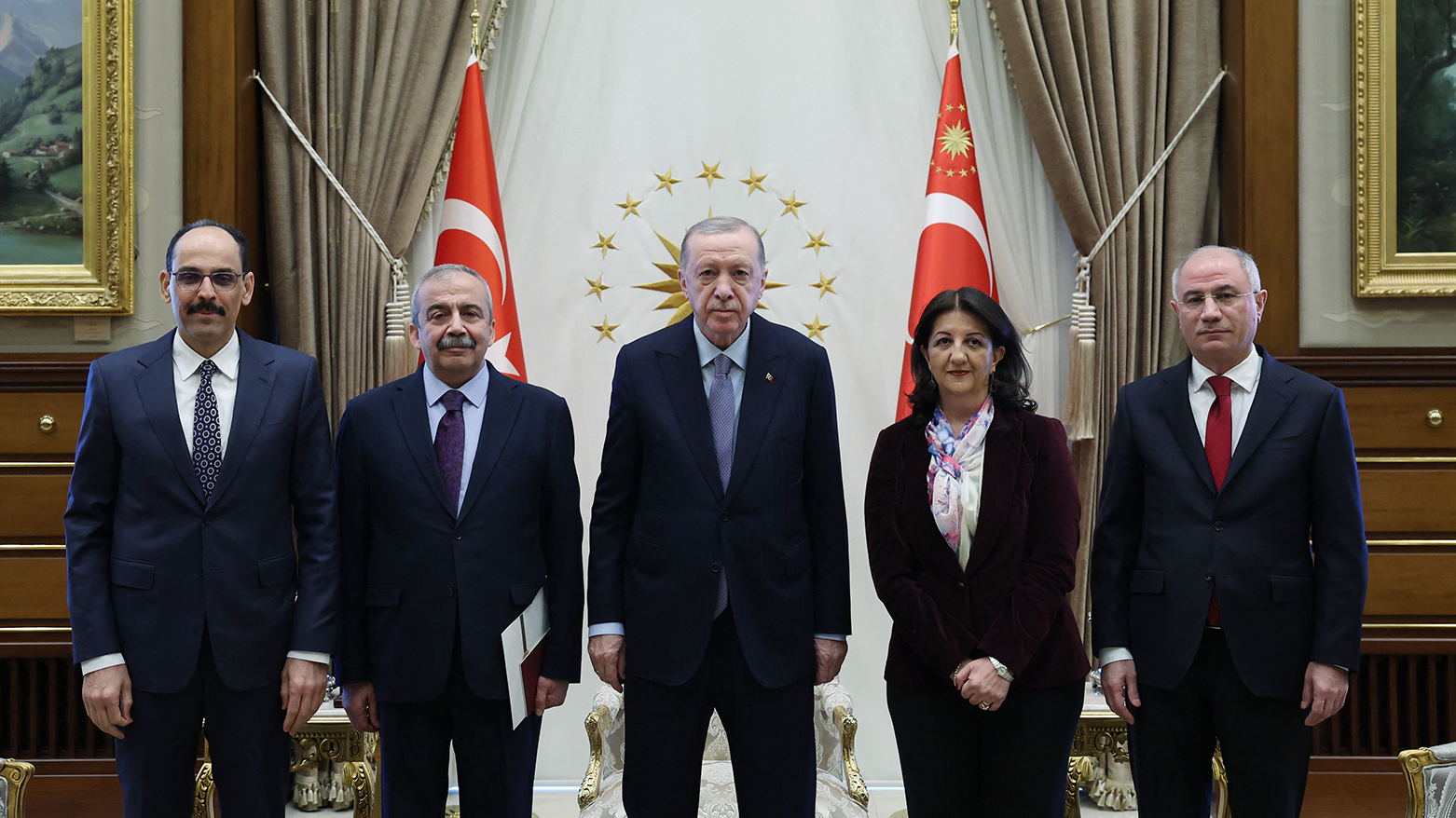Renewed Signals for Peace: DEM delegation to brief Ocalan on Erdogan meeting
DEM Co-chair and delegation member Pervin Buldan confirmed that the party’s recent discussions with Erdogan provided "a strong impetus for launching a new stage" in the peace process.

By Ahora Qadi
ERBIL (Kurdistan 24) – In what could mark a historic turning point in Türkiye’s long-troubled Kurdish question, a delegation from the Peoples’ Equality and Democracy Party (DEM) is preparing for a visit to İmralı Island to brief Abdullah Ocalan, the imprisoned leader of the Kurdistan Workers' Party (PKK)—a group designated as a terrorist organization by the EU, the US, and Türkiye—, on the outcomes of their recent meeting with Turkish President Recep Tayyip Erdogan.
This will be the fourth time a DEM delegation travels to the island, signaling renewed momentum for a political dialogue that many hope could lay the groundwork for a peaceful resolution to decades of conflict.
DEM: Erdogan meeting marks potential new phase in peace efforts
Speaking at a press conference, DEM Co-chair and delegation member Pervin Buldan confirmed that the party’s recent discussions with Erdogan provided "a strong impetus for launching a new stage" in the peace process. Buldan emphasized that re-establishing communication with Ocalan was critical for the process to move forward.
"Success in any peace initiative requires legal clarity," she stated, urging the Turkish Parliament to assume its responsibility in constructing a legal framework that could sustain and legitimize the initiative.
Talks with Turkish justice ministry planned this week
Buldan revealed that the DEM delegation is scheduled to meet with the Turkish Minister of Justice later this week to discuss establishing a comprehensive legal foundation for the anticipated peace process. This step, she explained, is essential for institutionalizing efforts to reach a negotiated settlement.
The move follows DEM’s clear stance that any dialogue with Ocalan must not occur in a political vacuum, but rather be rooted in constitutional and legal mechanisms that ensure transparency, continuity, and public trust.
Erdogan meeting described as ‘constructive and promising’
On Thursday, President Erdogan hosted a DEM delegation at the presidential palace in Ankara. The meeting, which lasted approximately 90 minutes, included DEM MPs Sırrı Süreyya Önder and Pervin Buldan, alongside National Intelligence Organization chief İbrahim Kalın and ruling Justice and Development Party (AKP) deputy chair Efkan Ala.
In a statement issued after the meeting, DEM characterized the dialogue as “positive and constructive,” affirming the party’s determination to help revive Ocalan ’s longstanding call for peace. “We proudly declare that today we are more optimistic than yesterday about the future of this process,” the statement read.
MHP leader proposes bold political bargain for peace
Earlier this year, Nationalist Movement Party (MHP) leader Devlet Bahçeli—an Erdogan ally—stunned observers by proposing the conditional release of Ocalan in exchange for his public disbandment of the PKK and the group’s final renunciation of armed struggle.
Bahçeli suggested that Parliament should host Ocalan so he could formally announce the PKK’s dissolution and be granted a pardon in return. President Erdogan welcomed the proposal, describing it as a “historic opportunity” to resolve the Kurdish issue once and for all.
Ocalan calls for PKK disarmament and dissolution
In February 2025, Ocalan issued a striking appeal from prison, calling on the PKK to disarm and dissolve itself. His message, delivered publicly by political allies in Istanbul, represented the most definitive statement yet in favor of ending armed conflict.
“I take full historical responsibility for this call,” Ocalan ’s message read. “All armed groups must lay down their weapons. The PKK must dismantle itself.”
A prisoner with enduring political influence
Now 75, Ocalan has been incarcerated on İmralı Island since 1999 after being captured in an international operation in Nairobi, Kenya. Though sentenced to death, his punishment was later commuted to life imprisonment following the abolition of capital punishment in Türkiye.
Despite his isolation, Ocalan has continued to wield influence over peace initiatives. He was at the heart of mediation efforts during past negotiation phases, including the 2013 peace process between the Turkish government and the PKK, which ultimately collapsed in 2015.
A long history of failed peace efforts
Since the early 1990s, successive attempts have been made to halt the armed conflict between Ankara and the PKK. A major ceasefire was declared in 1993, followed by secret intelligence-led negotiations with Ocalan in prison beginning in 2011. During that period, Kurdish politicians shuttled messages between him and PKK commanders in the Qandil Mountains in the Kurdistan Region.
The 2013 peace accord, announced with great fanfare, was widely welcomed across Türkiye. However, rising tensions and mutual distrust led to the breakdown of talks just two years later, plunging the country back into conflict.
Hope rises, but hurdles remain
The latest developments represent the clearest indication in years that a return to dialogue is possible. Yet analysts caution that without clear legal safeguards, public buy-in, and sincere political commitment from all sides, the initiative could once again falter.
Whether this latest chapter leads to lasting peace or becomes another missed opportunity depends not only on words exchanged in Ankara or İmralı, but on the willingness of Türkiye’s political institutions to prioritize reconciliation over confrontation.
